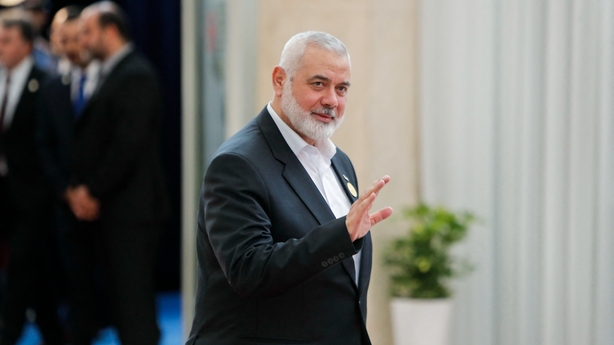US Secretary of State Antony Blinken has urged "all parties" in the Middle East to stop "escalatory actions" and achieve a ceasefire in Gaza.
It comes after Hamas's political leader was killed in a strike in Tehran that Iran blamed on Israel.
The strike that killed Ismail Haniyeh came just hours after Israel said it had killed a top Hezbollah commander in a retaliatory strike on the Lebanese capital Beirut.
The killings took place as regional tensions were already inflamed by the war in Gaza, a conflict that has drawn in Iran-backed militant groups in Syria, Lebanon, Iraq and Yemen.
Israel has declined to comment on the Tehran strike.
Speaking in the Mongolian capital, Mr Blinken warned the Middle East was on a path "toward more conflict, more violence, more suffering, more insecurity, and it is crucial that we break this cycle".
"That starts with a ceasefire that we've been working on," he told reporters.
"And to get there, it also first requires all parties to talk, to stop taking any escalatory actions, it requires them to find reasons to come to an agreement," he said.

As he did on Wednesday in Singapore, Mr Blinken did not comment directly on the death of the leader of the Palestinian Islamist movement.
He also declined to speculate on the impact that Haniyeh's killing could have on a potential ceasefire in Gaza, which the US has been spearheading along with Egypt and Qatar.
United Nations Security Council countries have also called for stepped-up diplomatic efforts to avert a wider conflict in the region.
"We fear the region is at the brink of all-out war," Japan's deputy UN representative, Shino Mitsuko, said, urging international efforts to prevent such a conflict.
China, Russia, Algeria and others condemned Mr Haniyeh's assassination, which Iran's UN ambassador called an act of terrorism, while the US, UK and France raised what they said was Iranian support for destabilising actors in the region.
China's Ambassador to the UN Fu Cong said failure to achieve a ceasefire in Gaza was responsible for worsening tensions.
"Countries with major influence must put more pressure and work more vigorously ... to put out the flames of war in Gaza," he said.
Read more: Tough-talking Haniyeh was seen as more moderate face of Hamas
Robert Wood, deputy US ambassador to the UN, called for members of the Security Council with influence over Iran "to increase pressure on it to stop escalating its proxy conflict against Israel and other actors."
Iran's UN Ambassador Amir Saeid Iravani said Tehran has consistently exercised maximum restraint but reserved its right to respond decisively. He called on the Security Council to condemn Israel and punish it with sanctions.
Israel's deputy representative to the UN, Jonathan Miller, called on the Security Council to condemn Iran for support of regional terrorism and increase sanctions on Tehran.
"We will defend ourselves and respond with great force against those who harm us," Mr Miller said, calling on the world to support Israel.
